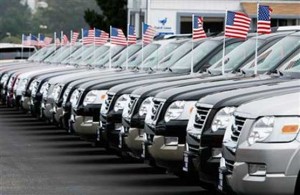
Memorial Day is normally a big event for car dealers, but initial data suggest that May could bring still more bad news for dealers and automakers alike.
We’ve been hearing and seeing a bit of good economic news, lately. Despite a pre-holiday slump, Wall Street is showing strong form and consumer sentiment seems to be gaining ground, as well. Could the U.S. automotive market be far behind?
If preliminary, mid-May sales data is any indication, yes, far, far behind.
“Based on our survey of dealers, completed just before the Memorial Day weekend, we estimate that U.S. light vehicle sales are on pace to decline by approx. 36.5% (year-over-year) in May,” warns Rod Lache, senior auto analyst with Deutsche Bank.
 Similar reports are echoing elsewhere, and though a last-minute market rush – Memorial Day is normally a big car buying time – could save the month, that appears highly unlikely, other analysts warn. So, if Lache’s count holds accurate, we’ll be looking at yet another painful decline in the so-called SAAR, or Seasonally-Adjusted Annual Sales Rate. From its peak of more than 17 million, in the early years of the decade, the number fell about 47% during the first quarter, to barely 9.5 million. April brought another decline, to 9.3 million, and the SAAR for May is looking to come in at a sorry 9.1 million.
Similar reports are echoing elsewhere, and though a last-minute market rush – Memorial Day is normally a big car buying time – could save the month, that appears highly unlikely, other analysts warn. So, if Lache’s count holds accurate, we’ll be looking at yet another painful decline in the so-called SAAR, or Seasonally-Adjusted Annual Sales Rate. From its peak of more than 17 million, in the early years of the decade, the number fell about 47% during the first quarter, to barely 9.5 million. April brought another decline, to 9.3 million, and the SAAR for May is looking to come in at a sorry 9.1 million.
Virtually everyone looks to be taking hits, this month, with bankrupt Chrysler down a whopping 45 percent compared to May ’08. General Motors, which faces the seemingly certain fate of also going Chapter 11, will likely be down around 40%, postulates Deutsche Bank’s Lache.
Recent studies, including one notable bit of research by CNW Marketing, show that despite the Obama Administration’s warranty program – which promises to back up purchases at GM and Chrysler – consumers remain wary of buying from a manufacturer they fear could vanish overnight. The decision to fire thousands of retailers, as the two makers reorganize, is proving controversial and there’s no guarantee that the remaining dealer body will be able to pick up the business lost at stores like those operated by the Monicatti brothers, in Sterling Heights, Michigan, which plans to convert to a used car outlet now that the brothers have lost their Chrysler franchise.
The May downturn may actually understate the decline among Detroit’s makers. A year ago, they were feeling the pinch of the gas price run-up, which sent many traditional truck buyers scurrying to trade in on smaller – often import-badged – products. On the other hand, that gave Japanese makers, such as Toyota and Honda, some good months, in an otherwise gloomy mid-2008. Now, with fuel prices almost $2 less, per gallon, small car and hybrid vehicle sales are slumping.
The Deutsche Bank dealer survey suggests Toyota will post a decline of around 39% for May, with Honda off a full 42% and Nissan down 36% for the full month of May.
The Memorial Day holiday brought with it a modest spike in fuel prices – up to near $2.40 during the holiday weekend, on average, across the country, according to AAA data. Whether the upward trend will continue remains uncertain, though crude oil continues its push up past the $60-a-barrel range, so far this week. The unanswered question is if and when consumers will once again begin migrating towards smaller cars and hybrids, once again.
Small and midsize models were clear beneficiaries of last year’s spike, with their share of the American market soaring from 37.4%, during the first quarter of 2008, to 43.2% during the following three months. Hybrids also gained traction, Toyota’s Prius alone reporting sales, in June of 2008, of more than 20,000 units. So far, this year, however, Toyota has been struggling to move more than 6,000 of its best-selling gas-electric sedan monthly.
The Japanese, collectively, made hay of the trend towards more fuel-efficient vehicles, Toyota hitting a share peak of 17.3%, up about 0.4 points, while Honda jumped from 11% to 11.8%.
But gravity can have painful results, contends Lache. Japanese small cars and hybrids have been disproportionately impacted by this year’s relatively cheap fuels, he notes, so, “The result should be (year-over-year) declines in market share for the (Japanese Big Three),” when May’s total sales are tallied up.
